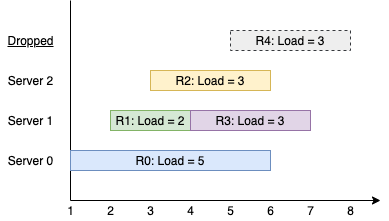LeetCode in Kotlin
1606. Find Servers That Handled Most Number of Requests
Hard
You have k servers numbered from 0 to k-1 that are being used to handle multiple requests simultaneously. Each server has infinite computational capacity but cannot handle more than one request at a time. The requests are assigned to servers according to a specific algorithm:
- The
ith(0-indexed) request arrives. - If all servers are busy, the request is dropped (not handled at all).
- If the
(i % k)thserver is available, assign the request to that server. - Otherwise, assign the request to the next available server (wrapping around the list of servers and starting from 0 if necessary). For example, if the
ithserver is busy, try to assign the request to the(i+1)thserver, then the(i+2)thserver, and so on.
You are given a strictly increasing array arrival of positive integers, where arrival[i] represents the arrival time of the ith request, and another array load, where load[i] represents the load of the ith request (the time it takes to complete). Your goal is to find the busiest server(s). A server is considered busiest if it handled the most number of requests successfully among all the servers.
Return a list containing the IDs (0-indexed) of the busiest server(s). You may return the IDs in any order.
Example 1:

Input: k = 3, arrival = [1,2,3,4,5], load = [5,2,3,3,3]
Output: [1]
Explanation:
All of the servers start out available.
The first 3 requests are handled by the first 3 servers in order.
Request 3 comes in. Server 0 is busy, so it’s assigned to the next available server, which is 1.
Request 4 comes in. It cannot be handled since all servers are busy, so it is dropped.
Servers 0 and 2 handled one request each, while server 1 handled two requests. Hence server 1 is the busiest server.
Example 2:
Input: k = 3, arrival = [1,2,3,4], load = [1,2,1,2]
Output: [0]
Explanation:
The first 3 requests are handled by first 3 servers.
Request 3 comes in. It is handled by server 0 since the server is available.
Server 0 handled two requests, while servers 1 and 2 handled one request each. Hence server 0 is the busiest server.
Example 3:
Input: k = 3, arrival = [1,2,3], load = [10,12,11]
Output: [0,1,2]
Explanation: Each server handles a single request, so they are all considered the busiest.
Constraints:
1 <= k <= 1051 <= arrival.length, load.length <= 105arrival.length == load.length1 <= arrival[i], load[i] <= 109arrivalis strictly increasing.
Solution
import java.util.PriorityQueue
import java.util.TreeSet
class Solution {
internal class Server(val id: Int, val busyTime: Int)
fun busiestServers(k: Int, arrival: IntArray, load: IntArray): List<Int> {
val available = TreeSet<Int>()
val busy = PriorityQueue({ a: Server, b: Server -> a.busyTime.compareTo(b.busyTime) })
val requestCount = IntArray(k)
val n = arrival.size
for (id in 0 until k) {
available.add(id)
}
for (i in 0 until n) {
val defaultServer = i % k
while (busy.isNotEmpty() && busy.peek().busyTime <= arrival[i]) {
val top = busy.poll()
available.add(top.id)
}
if (available.isEmpty()) {
continue
}
var nextServer = available.ceiling(defaultServer)
nextServer = nextServer ?: available.ceiling(0)
val requestEnd = arrival[i] + load[i]
available.remove(nextServer)
busy.add(Server(nextServer, requestEnd))
requestCount[nextServer]++
}
var maxRequests = Int.MIN_VALUE
val busiestServers: MutableList<Int> = ArrayList()
for (id in 0 until k) {
maxRequests = Math.max(maxRequests, requestCount[id])
}
for (id in 0 until k) {
if (requestCount[id] == maxRequests) {
busiestServers.add(id)
}
}
return busiestServers
}
}

